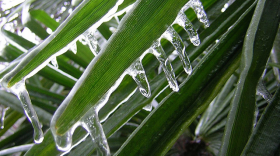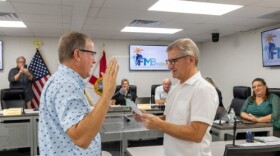Broward Schools Superintendent Robert Runcie said he wants schools in his county to be the safest in the nation.
His pledge comes one year after 17 students and staff members were murdered, and another 17 were injured, during the shooting at Marjory Stoneman Douglas High School in Parkland.
"I, as a superintendent in this district, own responsibility for making sure that we're doing every single thing we can in our power to make our schools as safe as possible," he said during an interview in his office this week.
At the school level, Runcie said principals are reponsible for security on their campuses.
"Principals have heard it loud and clear from me and senior staff," he said.
They have seen a video of the Feb. 14, 2018, shooting, according to Runcie, who made the decision to show the footage at meetings with principals and assistant principals.
"If we're going to make our school district the safest school district in this nation, then all of our school leaders need to understand what's at stake," he said.
Next week, the Broward County school board is expected to vote on two items related to school safety: hard corners, which Runcie calls "safer spaces," and a policy governing "code reds," or active shooter situations.
Both were recommendations from the state committee tasked with investigating the shooting. Members, including parents of slain students, have said these measures are long overdue and have questioned Runcie's "sense of urgency."
(Runcie argued the district mobilized immediately to take care of students' and staff members' mental health needs following the shooting. And he blamed bureaucratic delays, such as laws that require public-comment periods before school boards can officially adopt new policies, for why the district is moving to adopt these new rules a year after the shooting.)
While Runcie says Broward schools have held active-shooter drills "for years," there was no formal "code red" policy in the district.
The Marjory Stoneman Douglas High School Public Safety Commission found the first verified "code red" wasn't called at the Parkland school last Feb. 14 until more than three minutes after the shooting began. The commission cited the lack of written "code red" policy as a contributing factor to the vulnerability of students and staff.
In January, Runcie said all Broward schools would have classrooms with so-called "safer spaces" — areas that are clearly marked and free of obstructions like furniture — by the end of February. That remains the goal, but Runcie says some local police departments have been reluctant to help the district identify the hard corners because "they feel that may create some liability for them."
The district has asked law enforcement to weigh in on where the hard corners should be, because the spaces are different in each classroom depending on the locations of the windows and doors. The idea is for students and teachers to have a place to hide where they would be out of the line of sight of a potential threat outside the classroom.
During the Stoneman Douglas shooting, the gunman shot through the windows in classroom doors, and at least one student was killed because she wasn't able to fit in a hard corner.
Establishing hard corners in classrooms is another recommendation from the state commission, and while the Broward school board is expected to adopt an official "safer spaces" policy, Runcie cautioned that defining, establishing and marking these spaces isn't a sole answer to school safety.
"There is a risk of being overly prescriptive in our solutions based upon what the last shooter did," he said. "If we do that, we're going to miss the boat on creating a more comprehensive security apparatus for Broward County Public Schools."
Part of that apparatus now includes a new agreement with the Broward County Sheriff's Office. It gives BSO live access to surveillance cameras inside schools.
"There's no restrictions on it," Runcie said.
Previously, Runcie had resisted calls from the state commission to allow law enforcement unfettered access to the cameras, citing federal laws that protect student privacy. The initial agreement with BSO that was presented to the Broward school board would let police watch school camera feeds only if there was an emergency.
But the superintendent reversed that position, he said in part because of input from Broward's new sheriff, Gregory Tony. Gov. Ron DeSantis appointed Tony after suspending the former sheriff, Scott Israel, for his agency's mistakes in responding to the shooting.
Runcie said he has sent the agreement to other local police departments, offering them access to the cameras as well.
Runcie said he's not longer worried about student-privacy concerns that law enforcement access could raise.
"If I've got to choose between safety and privacy, I'm going with safety every day," he said.
Copyright 2020 WLRN 91.3 FM. To see more, visit WLRN 91.3 FM. 9(MDAyMTYyMTU5MDEyOTc4NzE4ODNmYWEwYQ004))









